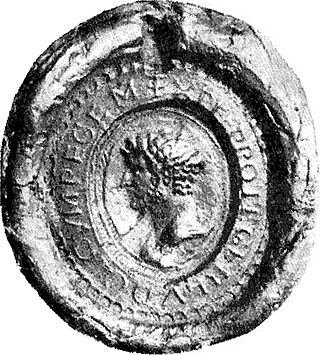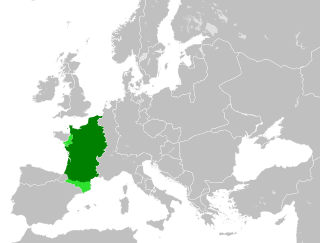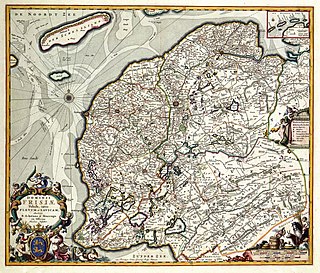Bubo (died 734), also spelled Bobbo, Poppo or Popo, was the pagan duke (dux) of the Frisians in the early eighth century. He is the first ruler whose name is known after Radbod (died 719). He did not recognise Frankish supremacy, and his territory probably only encompassed the north of Radbod's Frisia. He was defeated in a short war by the forces of Charles Martel, the duke of the Franks, in the Battle of the Boorne. The Frankish chroniclers, such as the Continuations of Fredegar, Vita Willibroridi of Alcuin and the Annales Mettenses priores , depict Bubo as a rebel and the Frankish invasion as a just war.
There was a rebellion—probably not led by Bubo—against Frankish rule in the region of Westergo in 733, which Charles put down. The inhabitants gave hostages, converted to Christianity and recognised Frankish overlordship, but after Charles left they were punished by their fellow Frisians. The next year (734), the Frisians rebelled again, this time under Bubo's leadership. Charles gathered a large fleet and army and prepared a naval invasion. Initial landings on Westergo and Ostergo [5] encountered no resistance, since Charles's aim was to bring Bubo to heel. This time no punitive measures were taken against the Frisians. Charles and Bubo's armies met on the banks of the river Boorne, perhaps at Oldeboorne, one of the Frisians' chief commercial centers at the time. The Franks appear to have coveted the trade that passed through there and through Domburg and Dorestad (which they already possessed). The Franks constructed a fortified encampment (castra) once on shore and the Frisian army was defeated. Bubo was killed in combat.
The death of Bubo marked an important phase in the destruction of Frisian paganism. Charles ordered the shrines (fana) to be destroyed and carried back to Francia "a great mass of spoils" (magna spolia et praeda). The Latin title victor given him by the chroniclers may indicate that he celebrated a Roman-style triumph on his return home.

Charles Martel was a Frankish political and military leader who, as Duke and Prince of the Franks and Mayor of the Palace, was the de facto ruler of the Franks from 718 until his death. He was a son of the Frankish statesman Pepin of Herstal and a noblewoman named Alpaida. Charles, also known as "The Hammer", successfully asserted his claims to power as successor to his father as the power behind the throne in Frankish politics. Continuing and building on his father's work, he restored centralized government in Francia and began the series of military campaigns that re-established the Franks as the undisputed masters of all Gaul. According to a near-contemporary source, the Liber Historiae Francorum, Charles was "a warrior who was uncommonly ... effective in battle".

Louis the German, also known as Louis II of Germany and Louis II of East Francia, was the first king of East Francia, and ruled from 843 to 876 AD. Grandson of emperor Charlemagne and the third son of Louis the Pious, emperor of Francia, and his first wife, Ermengarde of Hesbaye, he received the appellation Germanicus shortly after his death, when East Francia became known as the kingdom of Germany.

Louis the Child, sometimes called Louis III or Louis IV, was the king of East Francia from 899 until his death and was also recognized as king of Lotharingia after 900. He was the last East Frankish ruler of the Carolingian dynasty. He succeeded his father, Arnulf, in East Francia and his elder illegitimate half-brother Zwentibold in Lotharingia.

The Carolingian dynasty was a Frankish noble family named after Charlemagne, grandson of mayor Charles Martel and a descendant of the Arnulfing and Pippinid clans of the 7th century AD. The dynasty consolidated its power in the 8th century, eventually making the offices of mayor of the palace and dux et princeps Francorum hereditary, and becoming the de facto rulers of the Franks as the real powers behind the Merovingian throne. In 751 the Merovingian dynasty which had ruled the Germanic Franks was overthrown with the consent of the Papacy and the aristocracy, and Pepin the Short, son of Martel, was crowned King of the Franks. The Carolingian dynasty reached its peak in 800 with the crowning of Charlemagne as the first Emperor of the Romans in the West in over three centuries. His death in 814 began an extended period of fragmentation of the Carolingian Empire and decline that would eventually lead to the evolution of the Kingdom of France and the Holy Roman Empire.

Hunald I, also spelled Hunold, Hunoald, Hunuald or Chunoald, was the Duke of Aquitaine from 735 until 745. Although nominally he was an officer of the Merovingian kings of Francia, in practice Aquitaine was completely autonomous when he inherited it. His rule corresponds to the lowest point of the Merovingian monarchy, when the kingdom was in fact ruled by the mayors of the palace. Hunald was forced at the outset of his reign to accept the authority of the mayor of the palace Charles Martel, but he tried three times to throw it off in open revolt. He was unsuccessful, although he did manage to retain Aquitaine undiminished. In 745, he retired to a monastery, giving power to his son Waiofar. He later went to Rome, where he died during an attack on the city.

In medieval history, West Francia or the Kingdom of the West Franks refers to the western part of the Frankish Empire established by Charlemagne. It was the forerunner of the future Kingdom of France and existed from 843 to 987. West Francia emerged from the partition of the Carolingian Empire in 843 under the Treaty of Verdun following the death of Charlemagne's son, Louis the Pious.
Drogo was a Frankish nobleman, the eldest son of Pippin of Heristal and Plectrudis. He was the duke of Champagne from the early 690s.
Theudoald was the Frankish mayor of the palace, briefly unopposed in 714 after the death of his grandfather, Pepin of Herstal. In 715, the nobility acclaimed Ragenfrid mayor of Neustria and Charles Martel mayor of Austrasia.
Ragenfrid was the mayor of the palace of Neustria and Burgundy from 715, when he filled the vacuum in Neustria caused by the death of Pepin of Heristal, until 718, when Charles Martel finally established himself over the whole Frankish kingdom.

The Battle of Tertry was an important engagement in Merovingian Gaul between the forces of Austrasia under Pepin II on one side and those of Neustria and Burgundy on the other. It took place in 687 at Tertry, Somme, and the battle is presented as an heroic account in the Annales mettenses priores. After achieving victory on the battlefield at Tertry, the Austrasians dictated the political future of the Neustrians.
The Battle of Amblève took place in 716 near Amel. The mayor of the palace of Austrasia, Charles Martel, defeated his Neustrian and Frisian rivals who were led by King Chilperic II, his mayor Ragenfrid, and Redbad, King of the Frisians. It was the first major victory of Martel in a long career of victories. In this battle Martel began demonstrating the military genius which would mark the remainder of his life.
Felix was a patrician in the Frankish kingdom under the Merovingians. He had his seat at Toulouse. According to the tenth-century Miracula sancti Martialis lemovicensis, Felix was "a noble and renowned patrician from the town of Toulouse, who had obtained authority over all the cities up to the Pyrenees and over the iniquitous people of the Wascones," that is, the Basques. Felix is probably the first ruler of the Duchy of Aquitaine that evolved from the old kingdom of Charibert II in the decades following his death (632) and Dagobert I's subjection of the Basques. Although he stands at the head of the list of semi-independent rulers of Aquitaine that extends through the Middle Ages, he is described as "mysterious" and "obscure".
Henry was the leading military commander of the last years of the Carolingian Empire. He was commander-in-chief under Kings Louis the Younger and Charles the Fat. His early career was mostly restricted to East Francia, his homeland, but after Charles inherited West Francia in 884 he was increasingly active there. During his time, raids by the Vikings peaked in Francia. The sources describe at least eight separate campaigns waged by Henry against the Vikings, most of them successful.
The Battle of the Boarn was an eighth century battle between the Franks and the Frisians near the mouth of the river Boarn in what is now the Dutch province of Friesland.

The March of Carinthia was a frontier district (march) of the Carolingian Empire created in 889. Before it was a march, it had been a principality or duchy ruled by native-born Slavic princes at first independently and then under Bavarian and subsequently Frankish suzerainty. The realm was divided into counties which, after the succession of the Carinthian duke to the East Frankish throne, were united in the hands of a single authority. When the march of Carinthia was raised into a Duchy in 976, a new Carinthian march was created. It became the later March of Styria.
The Annals of Metz are a set of Latin Carolingian annals covering the period of Frankish history from the victory of Pepin II in the Battle of Tertry (687) to the time of writing. Although the annals do cover events following 806, these sections are not original writings but are additions borrowed from other texts and appended to the original annals in the 9th and 12th centuries.

The Frisian Kingdom, also known as Magna Frisia, is a modern name for the post-Roman Frisian realm in Western Europe in the period when it was at its largest (650–734). This dominion was ruled by kings and emerged in the mid-7th century and probably ended with the Battle of the Boarn in 734 when the Frisians were defeated by the Frankish Empire. It lay mainly in what is now the Netherlands and – according to some 19th century authors – extended from the Zwin near Bruges in Belgium to the Weser in Germany. The center of power was the city of Utrecht.

The Lordship of Frisia or Lordship of Friesland was a feudal dominion in the Netherlands. It was formed in 1498 by King Maximilian I and reformed in 1524 when Emperor Charles V conquered Frisia.

The Avar Wars were fought between Francia and the Avar Khaganate in Central Europe from 788 to 803, and ended with the Frankish conquest of the khaganate's western regions. The first conflicts between the Avars and the Franks occurred in the 560s, shortly before the Avar conquest of the Pannonian Basin. Armed conflicts between the two powers were not unusual during the following centuries.










